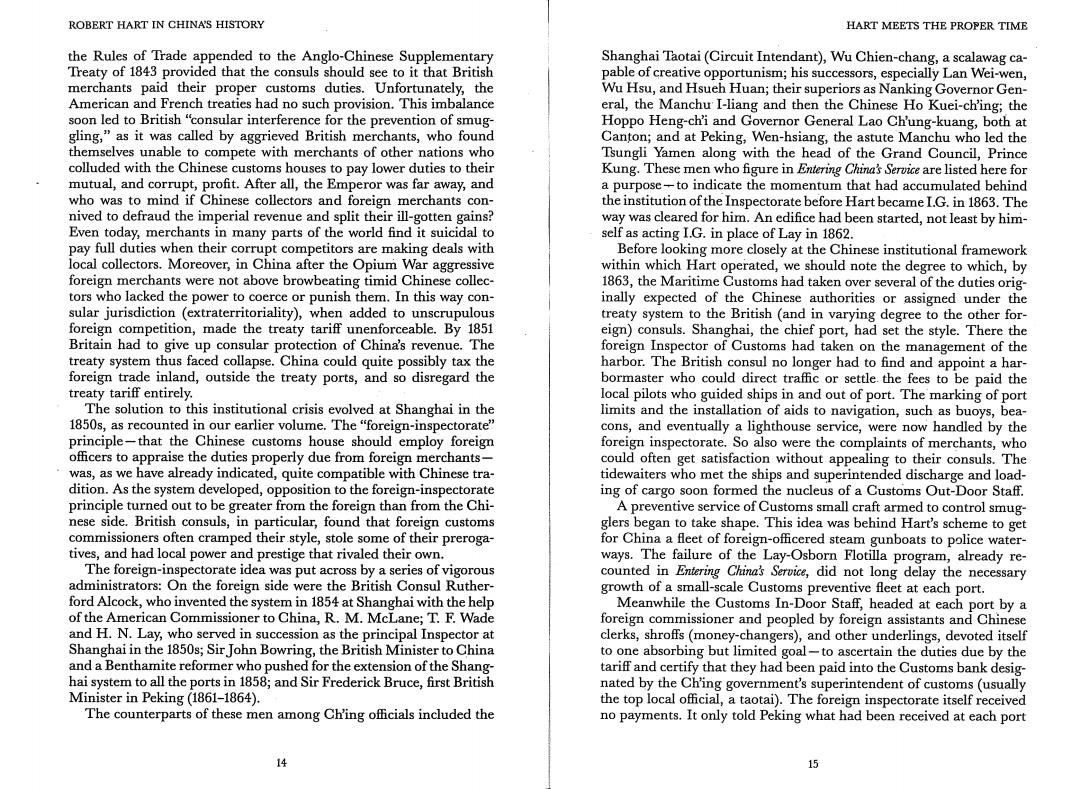
ROBERT HART IN CHINAS HISTORY HART MEETS THE PROPER TIME the Rules of Trade appended to the Anglo-Chinese Supplementary Shanghai Taotai(Circuit Intendant),Wu Chien-chang,a scalawag ca- Treaty of 1843 provided that the consuls should see to it that British pable of creative opportunism;his successors,especially Lan Wei-wen, merchants paid their proper customs duties.Unfortunately,the Wu Hsu,and Hsueh Huan;their superiors as Nanking Governor Gen- American and French treaties had no such provision.This imbalance eral,the Manchu I-liang and then the Chinese Ho Kuei-ch'ing;the soon led to British"consular interference for the prevention of smug- Hoppo Heng-ch'i and Governor General Lao Ch'ung-kuang,both at gling,"as it was called by aggrieved British merchants,who found Canton;and at Peking,Wen-hsiang,the astute Manchu who led the themselves unable to compete with merchants of other nations who Tsungli Yamen along with the head of the Grand Council,Prince colluded with the Chinese customs houses to pay lower duties to their Kung.These men who figure in Entering China's Service are listed here for mutual,and corrupt,profit.After all,the Emperor was far away,and a purpose-to indicate the momentum that had accumulated behind who was to mind if Chinese collectors and foreign merchants con- the institution of the Inspectorate before Hart became I.G.in 1863.The nived to defraud the imperial revenue and split their ill-gotten gains? way was cleared for him.An edifice had been started,not least by him- Even today,merchants in many parts of the world find it suicidal to self as acting I.G.in place of Lay in 1862. pay full duties when their corrupt competitors are making deals with Before looking more closely at the Chinese institutional framework local collectors.Moreover,in China after the Opium War aggressive within which Hart operated,we should note the degree to which,by foreign merchants were not above browbeating timid Chinese collec- 1863,the Maritime Customs had taken over several of the duties orig- tors who lacked the power to coerce or punish them.In this way con- inally expected of the Chinese authorities or assigned under the sular jurisdiction (extraterritoriality),when added to unscrupulous treaty system to the British(and in varying degree to the other for- foreign competition,made the treaty tariff unenforceable.By 1851 eign)consuls.Shanghai,the chief port,had set the style.There the Britain had to give up consular protection of China's revenue.The foreign Inspector of Customs had taken on the management of the treaty system thus faced collapse.China could quite possibly tax the harbor.The British consul no longer had to find and appoint a har- foreign trade inland,outside the treaty ports,and so disregard the bormaster who could direct traffic or settle.the fees to be paid the treaty tariff entirely. local pilots who guided ships in and out of port.The marking of port The solution to this institutional crisis evolved at Shanghai in the limits and the installation of aids to navigation,such as buoys,bea- 1850s,as recounted in our earlier volume.The"foreign-inspectorate" cons,and eventually a lighthouse service,were now handled by the principle-that the Chinese customs house should employ foreign foreign inspectorate.So also were the complaints of merchants,who officers to appraise the duties properly due from foreign merchants- could often get satisfaction without appealing to their consuls.The was,as we have already indicated,quite compatible with Chinese tra- tidewaiters who met the ships and superintended discharge and load- dition.As the system developed,opposition to the foreign-inspectorate ing of cargo soon formed the nucleus of a Customs Out-Door Staff. principle turned out to be greater from the foreign than from the Chi- A preventive service of Customs small craft armed to control smug- nese side.British consuls,in particular,found that foreign customs glers began to take shape.This idea was behind Hart's scheme to get commissioners often cramped their style,stole some of their preroga- for China a fleet of foreign-officered steam gunboats to police water- tives,and had local power and prestige that rivaled their own. ways.The failure of the Lay-Osborn Flotilla program,already re- The foreign-inspectorate idea was put across by a series of vigorous counted in Entering Chinas Service,did not long delay the necessary administrators:On the foreign side were the British Consul Ruther- growth of a small-scale Customs preventive fleet at each port. ford Alcock,who invented the system in 1854 at Shanghai with the help Meanwhile the Customs In-Door Staff,headed at each port by a of the American Commissioner to China,R.M.McLane;T.F.Wade foreign commissioner and peopled by foreign assistants and Chinese and H.N.Lay,who served in succession as the principal Inspector at clerks,shroffs(money-changers),and other underlings,devoted itself Shanghai in the 1850s;Sir John Bowring,the British Minister to China to one absorbing but limited goal-to ascertain the duties due by the and a Benthamite reformer who pushed for the extension of the Shang- tariff and certify that they had been paid into the Customs bank desig- hai system to all the ports in 1858;and Sir Frederick Bruce,first British nated by the Ch'ing government's superintendent of customs(usually Minister in Peking(1861-1864). the top local official,a taotai).The foreign inspectorate itself received The counterparts of these men among Ch'ing officials included the no payments.It only told Peking what had been received at each port g 15
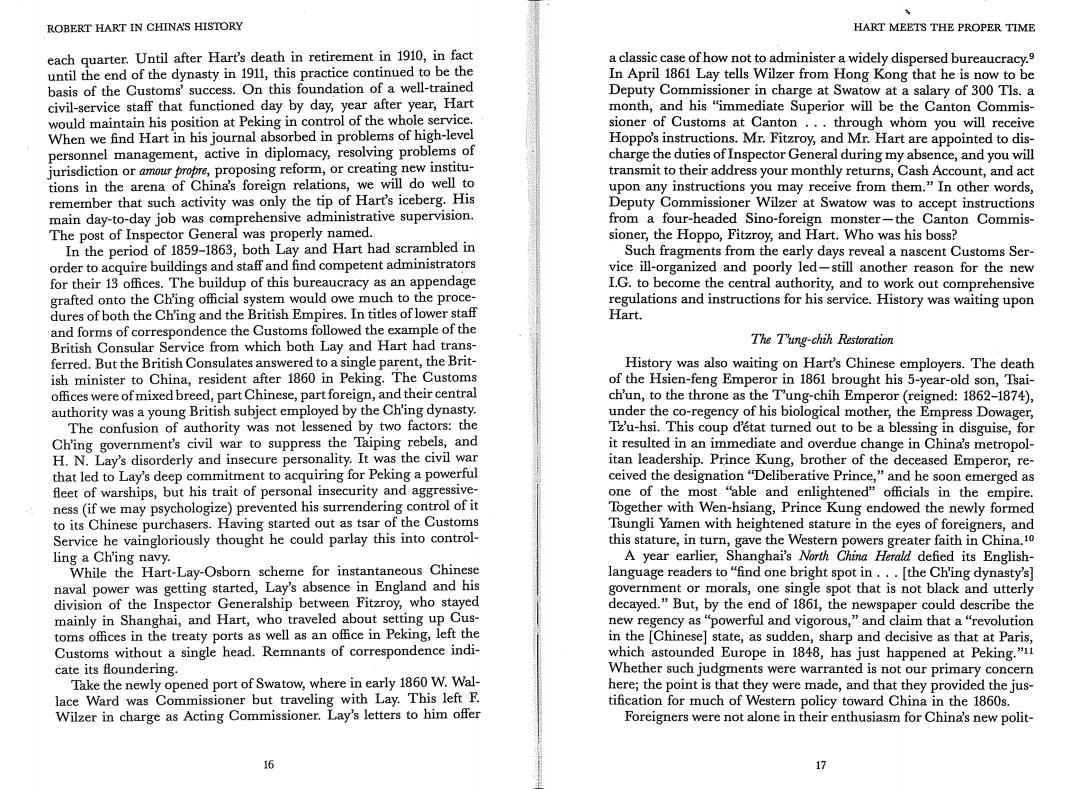
ROBERT HART IN CHINAS HISTORY HART MEETS THE PROPER TIME each quarter.Until after Hart's death in retirement in 1910,in fact a classic case of how not to administer a widely dispersed bureaucracy. until the end of the dynasty in 1911,this practice continued to be the In April 1861 Lay tells Wilzer from Hong Kong that he is now to be basis of the Customs'success.On this foundation of a well-trained Deputy Commissioner in charge at Swatow at a salary of 300 Tls.a civil-service staff that functioned day by day,year after year,Hart month,and his "immediate Superior will be the Canton Commis- would maintain his position at Peking in control of the whole service. sioner of Customs at Canton ..through whom you will receive When we find Hart in his journal absorbed in problems of high-level Hoppo's instructions.Mr.Fitzroy,and Mr.Hart are appointed to dis- personnel management,active in diplomacy,resolving problems of charge the duties of Inspector General during my absence,and you will jurisdiction or amour propre,proposing reform,or creating new institu- transmit to their address your monthly returns,Cash Account,and act tions in the arena of China's foreign relations,we will do well to upon any instructions you may receive from them."In other words, remember that such activity was only the tip of Hart's iceberg.His Deputy Commissioner Wilzer at Swatow was to accept instructions main day-to-day job was comprehensive administrative supervision. from a four-headed Sino-foreign monster-the Canton Commis- The post of Inspector General was properly named. sioner,the Hoppo,Fitzroy,and Hart.Who was his boss? In the period of 1859-1863,both Lay and Hart had scrambled in Such fragments from the early days reveal a nascent Customs Ser- order to acquire buildings and staff and find competent administrators vice ill-organized and poorly led-still another reason for the new for their 13 offices.The buildup of this bureaucracy as an appendage I.G.to become the central authority,and to work out comprehensive grafted onto the Ch'ing official system would owe much to the proce- regulations and instructions for his service.History was waiting upon dures of both the Ch'ing and the British Empires.In titles of lower staff Hart. and forms of correspondence the Customs followed the example of the British Consular Service from which both Lay and Hart had trans- The T'ung-chih Restoration ferred.But the British Consulates answered to a single parent,the Brit- History was also waiting on Hart's Chinese employers.The death ish minister to China,resident after 1860 in Peking.The Customs of the Hsien-feng Emperor in 1861 brought his 5-year-old son,Tsai- offices were of mixed breed,part Chinese,part foreign,and their central ch'un,to the throne as the T'ung-chih Emperor(reigned:1862-1874), authority was a young British subject employed by the Ch'ing dynasty. under the co-regency of his biological mother,the Empress Dowager, The confusion of authority was not lessened by two factors:the T'u-hsi.This coup d'etat turned out to be a blessing in disguise,for Ch'ing government's civil war to suppress the Taiping rebels,and it resulted in an immediate and overdue change in China's metropol- H.N.Lay's disorderly and insecure personality.It was the civil war itan leadership.Prince Kung,brother of the deceased Emperor,re- that led to Lay's deep commitment to acquiring for Peking a powerful ceived the designation"Deliberative Prince,"and he soon emerged as fleet of warships,but his trait of personal insecurity and aggressive- one of the most "able and enlightened"officials in the empire. ness(if we may psychologize)prevented his surrendering control of it Together with Wen-hsiang,Prince Kung endowed the newly formed to its Chinese purchasers.Having started out as tsar of the Customs Tsungli Yamen with heightened stature in the eyes of foreigners,and Service he vaingloriously thought he could parlay this into control- this stature,in turn,gave the Western powers greater faith in China.10 ling a Ch'ing navy. A year earlier,Shanghai's North China Herald defied its English- While the Hart-Lay-Osborn scheme for instantaneous Chincse language readers to "find one bright spot in...[the Ch'ing dynasty's] naval power was getting started,Lay's absence in England and his government or morals,one single spot that is not black and utterly division of the Inspector Generalship between Fitzroy,who stayed decayed."But,by the end of 1861,the newspaper could describe the mainly in Shanghai,and Hart,who traveled about setting up Cus- new regency as“powerful and vigorous,”and claim that a“revolution toms offices in the treaty ports as well as an office in Peking,left the in the [Chinese]state,as sudden,sharp and decisive as that at Paris, Customs without a single head.Remnants of correspondence indi- which astounded Europe in 1848,has just happened at Peking." cate its floundering. Whether such judgments were warranted is not our primary concern Take the newly opened port of Swatow,where in early 1860 W.Wal- here;the point is that they were made,and that they provided the jus- lace Ward was Commissioner but traveling with Lay.This left F. tification for much of Western policy toward China in the 1860s. Wilzer in charge as Acting Commissioner.Lay's letters to him offer Foreigners were not alone in their enthusiasm for China's new polit- 16 17
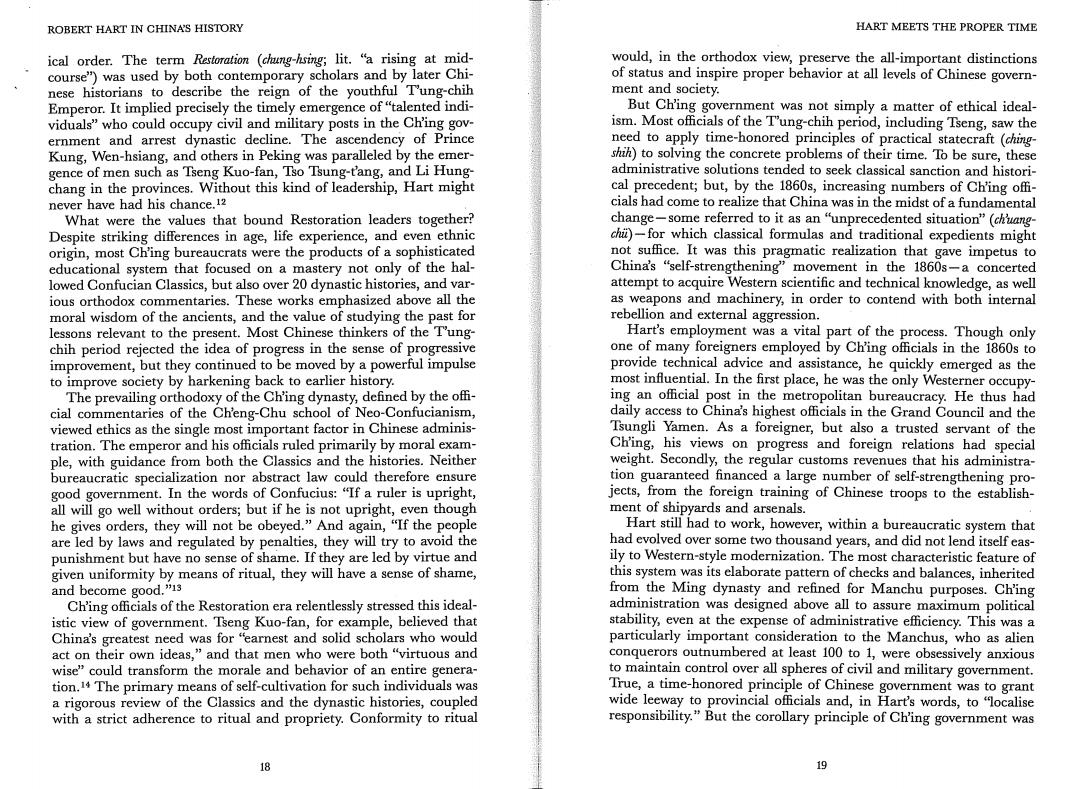
ROBERT HART IN CHINAS HISTORY HART MEETS THE PROPER TIME ical order.The term Restoration (chung-hsing;lit."a rising at mid- would,in the orthodox view,preserve the all-important distinctions course")was used by both contemporary scholars and by later Chi- of status and inspire proper behavior at all levels of Chinese govern- nese historians to describe the reign of the youthful T'ung-chih ment and society. Emperor.It implied precisely the timely emergence of "talented indi- But Ch'ing government was not simply a matter of ethical ideal- viduals"who could occupy civil and military posts in the Ch'ing gov- ism.Most officials of the Tung-chih period,including Tseng,saw the ernment and arrest dynastic decline.The ascendency of Prince need to apply time-honored principles of practical statecraft(ching- Kung,Wen-hsiang,and others in Peking was paralleled by the emer- shih)to solving the concrete problems of their time.To be sure,these gence of men such as Tseng Kuo-fan,Tso Tsung-t'ang,and Li Hung- administrative solutions tended to seek classical sanction and histori- chang in the provinces.Without this kind of leadership,Hart might cal precedent;but,by the 1860s,increasing numbers of Ch'ing offi- never have had his chance.12 cials had come to realize that China was in the midst of a fundamental What were the values that bound Restoration leaders together? change-some referred to it as an"unprecedented situation"(chuang- Despite striking differences in age,life experience,and even ethnic chii)-for which classical formulas and traditional expedients might origin,most Ch'ing bureaucrats were the products of a sophisticated not suffice.It was this pragmatic realization that gave impetus to educational system that focused on a mastery not only of the hal- China's "self-strengthening"movement in the 1860s-a concerted lowed Confucian Classics,but also over 20 dynastic histories,and var- attempt to acquire Western scientific and technical knowledge,as well ious orthodox commentaries.These works emphasized above all the as weapons and machinery,in order to contend with both internal moral wisdom of the ancients,and the value of studying the past for rebellion and external aggression. lessons relevant to the present.Most Chinese thinkers of the T'ung- Hart's employment was a vital part of the process.Though only chih period rejected the idea of progress in the sense of progressive one of many foreigners employed by Ch'ing officials in the 1860s to improvement,but they continued to be moved by a powerful impulse provide technical advice and assistance,he quickly emerged as the to improve society by harkening back to earlier history. most influential.In the first place,he was the only Westerner occupy- The prevailing orthodoxy of the Ch'ing dynasty,defined by the offi- ing an official post in the metropolitan bureaucracy.He thus had cial commentaries of the Ch'eng-Chu school of Neo-Confucianism, daily access to China's highest officials in the Grand Council and the viewed ethics as the single most important factor in Chinese adminis- Tsungli Yamen.As a foreigner,but also a trusted servant of the tration.The emperor and his officials ruled primarily by moral exam- Ch'ing,his views on progress and foreign relations had special ple,with guidance from both the Classics and the histories.Neither weight.Secondly,the regular customs revenues that his administra- bureaucratic specialization nor abstract law could therefore ensure tion guaranteed financed a large number of self-strengthening pro- good government.In the words of Confucius:"If a ruler is upright, jects,from the foreign training of Chinese troops to the establish- all will go well without orders;but if he is not upright,even though ment of shipyards and arsenals. he gives orders,they will not be obeyed."And again,"If the people Hart still had to work,however,within a bureaucratic system that are led by laws and regulated by penalties,they will try to avoid the had evolved over some two thousand years,and did not lend itself eas- punishment but have no sense of shame.If they are led by virtue and ily to Western-style modernization.The most characteristic feature of given uniformity by means of ritual,they will have a sense of shame, this system was its elaborate pattern of checks and balances,inherited and become good."13 from the Ming dynasty and refined for Manchu purposes.Ch'ing Ch'ing officials of the Restoration era relentlessly stressed this ideal- administration was designed above all to assure maximum political istic view of government.Tseng Kuo-fan,for example,believed that stability,even at the expense of administrative efficiency.This was a China's greatest need was for"earnest and solid scholars who would particularly important consideration to the Manchus,who as alien act on their own ideas,"and that men who were both "virtuous and conquerors outnumbered at least 100 to 1,were obsessively anxious wise"could transform the morale and behavior of an entire genera- to maintain control over all spheres of civil and military government. tion.14 The primary means of self-cultivation for such individuals was True,a time-honored principle of Chinese government was to grant a rigorous review of the Classics and the dynastic histories,coupled wide leeway to provincial officials and,in Hart's words,to "localise with a strict adherence to ritual and propriety.Conformity to ritual responsibility."But the corollary principle of Ch'ing government was 18 19
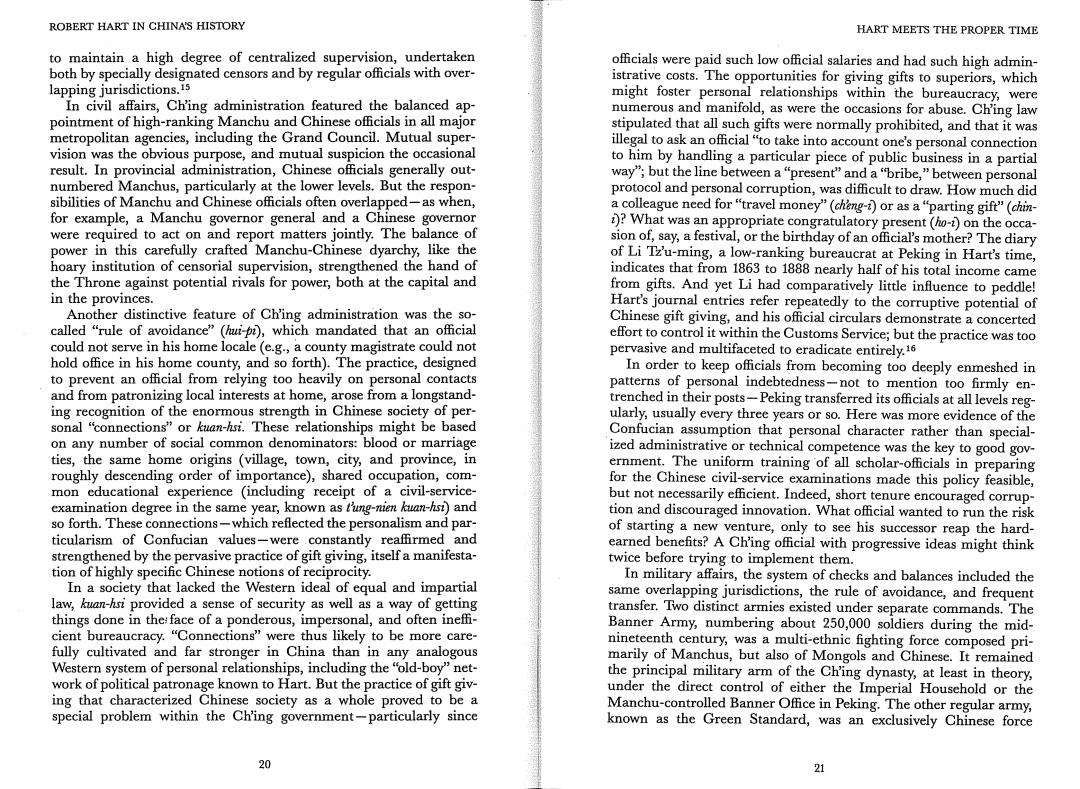
ROBERT HART IN CHINAS HISTORY HART MEETS THE PROPER TIME to maintain a high degree of centralized supervision,undertaken officials were paid such low official salaries and had such high admin- both by specially designated censors and by regular officials with over- istrative costs.The opportunities for giving gifts to superiors,which lapping jurisdictions.is might foster personal relationships within the bureaucracy,were In civil affairs,Ch'ing administration featured the balanced ap- numerous and manifold,as were the occasions for abuse.Ch'ing law pointment of high-ranking Manchu and Chinese officials in all major stipulated that all such gifts were normally prohibited,and that it was metropolitan agencies,including the Grand Council.Mutual super- illegal to ask an official "to take into account one's personal connection vision was the obvious purpose,and mutual suspicion the occasional to him by handling a particular piece of public business in a partial result.In provincial administration,Chinese officials generally out- way";but the line between a"present"and a"bribe,"between personal numbered Manchus,particularly at the lower levels.But the respon- protocol and personal corruption,was difficult to draw.How much did sibilities of Manchu and Chinese officials often overlapped-as when, a colleague need for"travel money"(cheng-i)or as a"parting gift"(chin- for example,a Manchu governor general and a Chinese governor )What was an appropriate congratulatory present (ho-i)on the occa- were required to act on and report matters jointly.The balance of sion of,say,a festival,or the birthday of an official's mother?The diary power in this carefully crafted Manchu-Chinese dyarchy,like the of Li T'u-ming,a low-ranking bureaucrat at Peking in Hart's time, hoary institution of censorial supervision,strengthened the hand of indicates that from 1863 to 1888 nearly half of his total income came the Throne against potential rivals for power,both at the capital and from gifts.And yet Li had comparatively little influence to peddle! in the provinces. Hart's journal entries refer repeatedly to the corruptive potential of Another distinctive feature of Ch'ing administration was the so- Chinese gift giving,and his official circulars demonstrate a concerted called "rule of avoidance"(uii),which mandated that an official effort to control it within the Customs Service;but the practice was too could not serve in his home locale(e.g.,a county magistrate could not pervasive and multifaceted to eradicate entirely.16 hold office in his home county,and so forth).The practice,designed In order to keep officials from becoming too deeply enmeshed in to prevent an official from relying too heavily on personal contacts patterns of personal indebtedness-not to mention too firmly en- and from patronizing local interests at home,arose from a longstand- trenched in their posts-Peking transferred its officials at all levels reg- ing recognition of the enormous strength in Chinese society of per- ularly,usually every three years or so.Here was more evidence of the sonal "connections"or kuan-hsi.These relationships might be based Confucian assumption that personal character rather than special- on any number of social common denominators:blood or marriage ized administrative or technical competence was the key to good gov- ties,the same home origins(village,town,city,and province,in ernment.The uniform training of all scholar-officials in preparing roughly descending order of importance),shared occupation,com- for the Chinese civil-service examinations made this policy feasible, mon educational experience (including receipt of a civil-service- but not necessarily efficient.Indeed,short tenure encouraged corrup- examination degree in the same year,known as t'ung-nien kuan-hsi)and tion and discouraged innovation.What official wanted to run the risk so forth.These connections-which reflected the personalism and par- of starting a new venture,only to see his successor reap the hard- ticularism of Confucian values-were constantly reaffirmed and earned benefits?A Ch'ing official with progressive ideas might think strengthened by the pervasive practice of gift giving,itself a manifesta- twice before trying to implement them. tion of highly specific Chinese notions of reciprocity. In military affairs,the system of checks and balances included the In a society that lacked the Western ideal of equal and impartial same overlapping jurisdictions,the rule of avoidance,and frequent law,kuan-hsi provided a sense of security as well as a way of getting transfer.Two distinct armies existed under separate commands.The things done in the:face of a ponderous,impersonal,and often ineffi- Banner Army,numbering about 250,000 soldiers during the mid- cient bureaucracy."Connections"were thus likely to be more care- nineteenth century,was a multi-ethnic fighting force composed pri- fully cultivated and far stronger in China than in any analogous marily of Manchus,but also of Mongols and Chinese.It remained Western system of personal relationships,including the"old-boy"net- the principal military arm of the Ch'ing dynasty,at least in theory, work of political patronage known to Hart.But the practice of gift giv- under the direct control of either the Imperial Household or the ing that characterized Chinese society as a whole proved to be a Manchu-controlled Banner Office in Peking.The other regular army, special problem within the Ch'ing government-particularly since known as the Green Standard,was an exclusively Chinese force 20
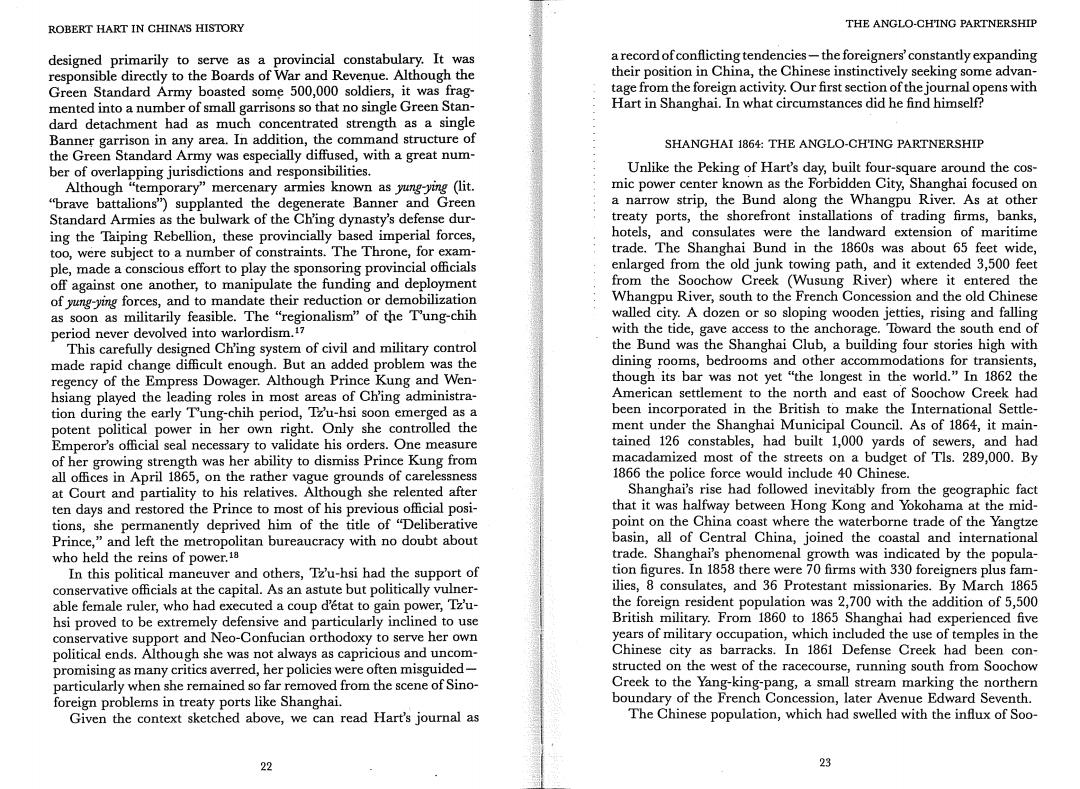
ROBERT HART IN CHINAS HISTORY THE ANGLO-CHING PARTNERSHIP designed primarily to serve as a provincial constabulary.It was a record ofconflicting tendencies-the foreigners'constantly expanding responsible directly to the Boards of War and Revenue.Although the their position in China,the Chinese instinctively seeking some advan- Green Standard Army boasted some 500,000 soldiers,it was frag- tage from the foreign activity.Our first section of thejournal opens with mented into a number of small garrisons so that no single Green Stan- Hart in Shanghai.In what circumstances did he find himself? dard detachment had as much concentrated strength as a single Banner garrison in any area.In addition,the command structure of SHANGHAI 1864:THE ANGLO-CHING PARTNERSHIP the Green Standard Army was especially diffused,with a great num- ber of overlapping jurisdictions and responsibilities. Unlike the Peking of Hart's day,built four-square around the cos- Although "temporary"mercenary armies known as yung-ying (lit. mic power center known as the Forbidden City,Shanghai focused on "brave battalions")supplanted the degenerate Banner and Green a narrow strip,the Bund along the Whangpu River.As at other Standard Armies as the bulwark of the Ch'ing dynasty's defense dur- treaty ports,the shorefront installations of trading firms,banks, ing the Taiping Rebellion,these provincially based imperial forces, hotels,and consulates were the landward extension of maritime too,were subject to a number of constraints.The Throne,for exam- trade.The Shanghai Bund in the 1860s was about 65 feet wide, ple,made a conscious effort to play the sponsoring provincial officials enlarged from the old junk towing path,and it extended 3,500 feet off against one another,to manipulate the funding and deployment from the Soochow Creek (Wusung River)where it entered the of yung ying forces,and to mandate their reduction or demobilization Whangpu River,south to the French Concession and the old Chinese as soon as militarily feasible.The "regionalism"of the Tung-chih walled city.A dozen or so sloping wooden jetties,rising and falling period never devolved into warlordism.17 with the tide,gave access to the anchorage.Toward the south end of This carefully designed Ch'ing system of civil and military control the Bund was the Shanghai Club,a building four stories high with made rapid change difficult enough.But an added problem was the dining rooms,bedrooms and other accommodations for transients, regency of the Empress Dowager.Although Prince Kung and Wen- though its bar was not yet "the longest in the world."In 1862 the hsiang played the leading roles in most areas of Ch'ing administra- American settlement to the north and east of Soochow Creek had tion during the early Tung-chih period,Tu-hsi soon emerged as a been incorporated in the British to make the International Settle- potent political power in her own right.Only she controlled the ment under the Shanghai Municipal Council.As of 1864,it main- Emperor's official seal necessary to validate his orders.One measure tained 126 constables,had built 1,000 yards of sewers,and had of her growing strength was her ability to dismiss Prince Kung from macadamized most of the streets on a budget of Tls.289,000.By all offices in April 1865,on the rather vague grounds of carelessness 1866 the police force would include 40 Chinese. at Court and partiality to his relatives.Although she relented after Shanghai's rise had followed inevitably from the geographic fact ten days and restored the Prince to most of his previous official posi- that it was halfway between Hong Kong and Yokohama at the mid- tions,she permanently deprived him of the title of "Deliberative point on the China coast where the waterborne trade of the Yangtze Prince,"and left the metropolitan bureaucracy with no doubt about basin,all of Central China,joined the coastal and international who held the reins of power.18 trade.Shanghai's phenomenal growth was indicated by the popula- In this political maneuver and others,T'u-hsi had the support of tion figures.In 1858 there were 70 firms with 330 foreigners plus fam- conservative officials at the capital.As an astute but politically vulner- ilies,8 consulates,and 36 Protestant missionaries.By March 1865 able female ruler,who had executed a coup d'etat to gain power,Tz'u- the foreign resident population was 2,700 with the addition of 5,500 hsi proved to be extremely defensive and particularly inclined to use British military.From 1860 to 1865 Shanghai had experienced five conservative support and Neo-Confucian orthodoxy to serve her own years of military occupation,which included the use of temples in the political ends.Although she was not always as capricious and uncom- Chinese city as barracks.In 1861 Defense Creek had been con- promising as many critics averred,her policies were often misguided- structed on the west of the racecourse,running south from Soochow particularly when she remained so far removed from the scene of Sino- Creek to the Yang-king-pang,a small stream marking the northern foreign problems in treaty ports like Shanghai. boundary of the French Concession,later Avenue Edward Seventh. Given the context sketched above,we can read Hart's journal as The Chinese population,which had swelled with the influx of Soo 22 23